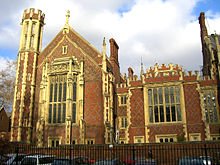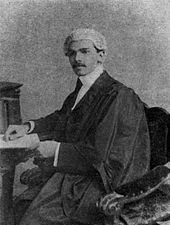Birth Date
Mahomed Ali Jinnah bhai
25 December 1876
Karachi, Bombay Presidency, British India
.jpeg)
Early Education
.jpeg)
As a boy, Jinnah lived for a time in Bombay with an aunt and may have attended the Gokal Das Tej Primary School there, later on studying at the Cathedral and John Connon School. In Karachi, he attended the Sindh-Madrasa-tul-Islam and the Christian Missionary Society High School.
Higher Education

In 1892, Sir Frederick Leigh Croft, a business associate of Jinnahbhai Poonja, offered young Jinnah a London apprenticeship with his firm, Graham's Shipping and Trading Company.[22] He accepted the position despite the opposition of his mother, who before he left, had him enter an arranged marriage with his cousin, two years his junior from the ancestral village of Paneli, Emibai Jinnah. Jinnah's mother and first wife both died during his absence in England.[23] Although the apprenticeship in London was considered a great opportunity for Jinnah, one reason for sending him overseas was a legal proceeding against his father, which placed the family's property at risk of being sequestered by the court. In 1893, the Jinnah bhai family moved to Bombay.
Legal and early political career

At the age of 20, Jinnah began his practice in Bombay, the only Muslim barrister in the city.[12] English had become his principal language and would remain so throughout his life. His first three years in the law, from 1897 to 1900, brought him few briefs. His first step towards a brighter career occurred when the acting Advocate General of Bombay, John Molesworth MacPherson, invited Jinnah to work from his chambers.[37][38] In 1900, P. H. Dastoor, a Bombay presidency magistrate, left the post temporarily and Jinnah succeeded in getting the interim position. After his six-month appointment period, Jinnah was offered a permanent position on a 1,500 rupee per month salary. Jinnah politely declined the offer, stating that he planned to earn 1,500 rupees a day—a huge sum at that time—which he eventually did.[37][38][39] Nevertheless, as Governor-General of Pakistan, he would refuse to accept a large salary, fixing it at 1 rupee per month.[40]
As a lawyer, Jinnah gained fame for his skilled handling of the 1908 "Caucus Case". This controversy arose out of Bombay municipal elections, which Indians alleged were rigged by a "caucus" of Europeans to keep Sir Pherozeshah Mehta out of the council.[41] Jinnah gained great esteem from leading the case for Sir Pherozeshah, himself a noted barrister. Although Jinnah did not win the Caucus Case, he posted a successful record, becoming well known for his advocacy and legal logic.[42][43] In 1908, his factional foe in the Indian National Congress, Bal Gangadhar Tilak, was arrested for sedition. Before Tilak unsuccessfully represented himself at trial, he engaged Jinnah in an attempt to secure his release on bail. Jinnah did not succeed, but obtained an acquittal for Tilak when he was charged with sedition again in 1916.[44]
One of Jinnah's fellow barristers from the Bombay High Court remembered that "Jinnah's faith in himself was incredible"; he recalled that on being admonished by a judge with "Mr. Jinnah, remember that you are not addressing a third-class magistrate", Jinnah shot back, "My Lord, allow me to warn you that you are not addressing a third-class pleader."[45] Another of his fellow barristers described him, saying:
Illness and Death

From the 1930s, Jinnah suffered from tuberculosis; only his sister and a few others close to him were aware of his condition. Jinnah believed public knowledge of his lung ailments would hurt him politically. In a 1938 letter, he wrote to a supporter that "you must have read in the papers how during my tours ... I suffered, which was not because there was anything wrong with me, but the irregularities [of the schedule] and over-strain told upon my health".[194][195] Many years later, Mountbatten stated that if he had known Jinnah was so physically ill, he would have stalled, hoping Jinnah's death would avert partition.[196] Fatima Jinnah later wrote, "even in his hour of triumph, the Quaid-e-Azam was gravely ill ... He worked in a frenzy to consolidate Pakistan. And, of course, he totally neglected his health ..."[197] Jinnah worked with a tin of Craven "A" cigarettes at his desk, of which he had smoked 50 or more a day for the previous 30 years, as well as a box of Cuban cigars. As his health got worse, he took longer and longer rest breaks in the private wing of Government House in Karachi, where only he, Fatima and the servants were allowed.[198]
In June 1948, he and Fatima flew to Quetta, in the mountains of Balochistan, where the weather was cooler than in Karachi. He could not completely rest there, addressing the officers at the Command and Staff College saying, "you, along with the other Forces of Pakistan, are the custodians of the life, property and honour of the people of Pakistan."[199] He returned to Karachi for 1 July opening ceremony for the State Bank of Pakistan, at which he spoke. A reception by the Canadian trade commissioner that evening in honour of Dominion Day was the last public event he attended.[200]
Thanks to steemit family
CX
@steemcourtor01
@steemcourtor02
@steemcourtor03
@steemcourtor04
Plagiarised Content
I don't know what do I say to you...!
Downvoting a post can decrease pending rewards and make it less visible. Common reasons:
Submit
This content appears to be plagiarised from -
https://en.wikipedia.org/wiki/Muhammad_Ali_Jinnah
If you have not already done so, you should head to the newcomers community and complete the newcomer achievement programme. Not only will you earn money through upvotes, you will learn about content etiquette;
You are currently in Stage 1 of our 4 Stage Process:
👉 Stage 1 - 1st Warning - Pointing offenders towards Achievement 3 and highlighting this process. All plagiarised posts currently pending rewards will be flagged and downvoted to $0 rewards.
Stage 2 - A Final Warning - Another request to stop and that plagiarism will not be tolerated. Downvotes amounting to 20% of total pending rewards according to steemworld.
Stage 3 - A stronger message - Downvotes amounting to 50% of pending rewards.
Stage 4 - The strongest message possible - Downvotes amounting to 100% of pending rewards.
Plagiarists will bypass stage 1 if translated from another language.
Downvoting a post can decrease pending rewards and make it less visible. Common reasons:
Submit
Downvoting a post can decrease pending rewards and make it less visible. Common reasons:
Submit